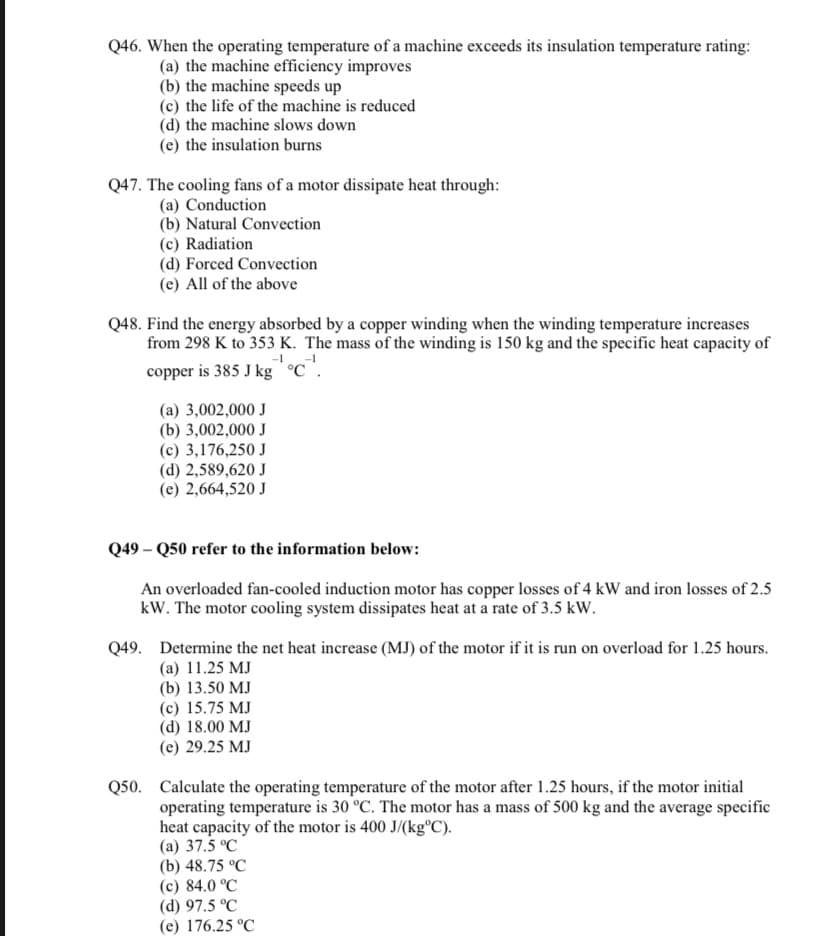Q46. When the operating temperature of a machine exceeds its insulation temperature rating: (a) the machine efficiency improves (b) the machine speeds up (c) the life of the machine is reduced (d) the machine slows down (e) the insulation burns Q47. The cooling fans of a motor dissipate heat through: (a) Conduction (b) Natural Convection (c) Radiation (d) Forced Convection (e) All of the above Q48. Find the energy absorbed by a copper winding when the winding temperature increases from 298 K to 353 K. The mass of the winding is 150 kg and the specific heat capacity of copper is 385 J kg ¹°C ¹. (a) 3,002,000 J (b) 3,002,000 J (c) 3,176,250 J (d) 2,589,620 J (e) 2 664 520 I
Q46. When the operating temperature of a machine exceeds its insulation temperature rating: (a) the machine efficiency improves (b) the machine speeds up (c) the life of the machine is reduced (d) the machine slows down (e) the insulation burns Q47. The cooling fans of a motor dissipate heat through: (a) Conduction (b) Natural Convection (c) Radiation (d) Forced Convection (e) All of the above Q48. Find the energy absorbed by a copper winding when the winding temperature increases from 298 K to 353 K. The mass of the winding is 150 kg and the specific heat capacity of copper is 385 J kg ¹°C ¹. (a) 3,002,000 J (b) 3,002,000 J (c) 3,176,250 J (d) 2,589,620 J (e) 2 664 520 I
Introductory Circuit Analysis (13th Edition)
13th Edition
ISBN:9780133923605
Author:Robert L. Boylestad
Publisher:Robert L. Boylestad
Chapter1: Introduction
Section: Chapter Questions
Problem 1P: Visit your local library (at school or home) and describe the extent to which it provides literature...
Related questions
Question

Transcribed Image Text:Q46. When the operating temperature of a machine exceeds its insulation temperature rating:
(a) the machine efficiency improves
(b) the machine speeds up
(c) the life of the machine is reduced
(d) the machine slows down
(e) the insulation burns
Q47. The cooling fans of a motor dissipate heat through:
(a) Conduction
(b) Natural Convection
(c) Radiation
(d) Forced Convection
(e) All of the above
Q48. Find the energy absorbed by a copper winding when the winding temperature increases
from 298 K to 353 K. The mass of the winding is 150 kg and the specific heat capacity of
copper is 385 J kg C.
(a) 3,002,000 J
(b) 3,002,000 J
(c) 3,176,250 J
(d) 2,589,620 J
(e) 2,664,520 J
Q49- Q50 refer to the information below:
An overloaded fan-cooled induction motor has copper losses of 4 kW and iron losses of 2.5
kW. The motor cooling system dissipates heat at a rate of 3.5 kW.
Q49. Determine the net heat increase (MJ) of the motor if it is run on overload for 1.25 hours.
(a) 11.25 MJ
(b) 13.50 MJ
(c) 15.75 MJ
(d) 18.00 MJ
(e) 29.25 MJ
Q50. Calculate the operating temperature of the motor after 1.25 hours, if the motor initial
operating temperature is 30 °C. The motor has a mass of 500 kg and the average specific
heat capacity of the motor is 400 J/(kg°C).
(a) 37.5 °C
(b) 48.75 °C
(c) 84.0 °C
(d) 97.5 °C
(e) 176.25 °C
Expert Solution
This question has been solved!
Explore an expertly crafted, step-by-step solution for a thorough understanding of key concepts.
Step by step
Solved in 2 steps

Knowledge Booster
Learn more about
Need a deep-dive on the concept behind this application? Look no further. Learn more about this topic, electrical-engineering and related others by exploring similar questions and additional content below.Recommended textbooks for you

Introductory Circuit Analysis (13th Edition)
Electrical Engineering
ISBN:
9780133923605
Author:
Robert L. Boylestad
Publisher:
PEARSON

Delmar's Standard Textbook Of Electricity
Electrical Engineering
ISBN:
9781337900348
Author:
Stephen L. Herman
Publisher:
Cengage Learning

Programmable Logic Controllers
Electrical Engineering
ISBN:
9780073373843
Author:
Frank D. Petruzella
Publisher:
McGraw-Hill Education

Introductory Circuit Analysis (13th Edition)
Electrical Engineering
ISBN:
9780133923605
Author:
Robert L. Boylestad
Publisher:
PEARSON

Delmar's Standard Textbook Of Electricity
Electrical Engineering
ISBN:
9781337900348
Author:
Stephen L. Herman
Publisher:
Cengage Learning

Programmable Logic Controllers
Electrical Engineering
ISBN:
9780073373843
Author:
Frank D. Petruzella
Publisher:
McGraw-Hill Education

Fundamentals of Electric Circuits
Electrical Engineering
ISBN:
9780078028229
Author:
Charles K Alexander, Matthew Sadiku
Publisher:
McGraw-Hill Education

Electric Circuits. (11th Edition)
Electrical Engineering
ISBN:
9780134746968
Author:
James W. Nilsson, Susan Riedel
Publisher:
PEARSON

Engineering Electromagnetics
Electrical Engineering
ISBN:
9780078028151
Author:
Hayt, William H. (william Hart), Jr, BUCK, John A.
Publisher:
Mcgraw-hill Education,